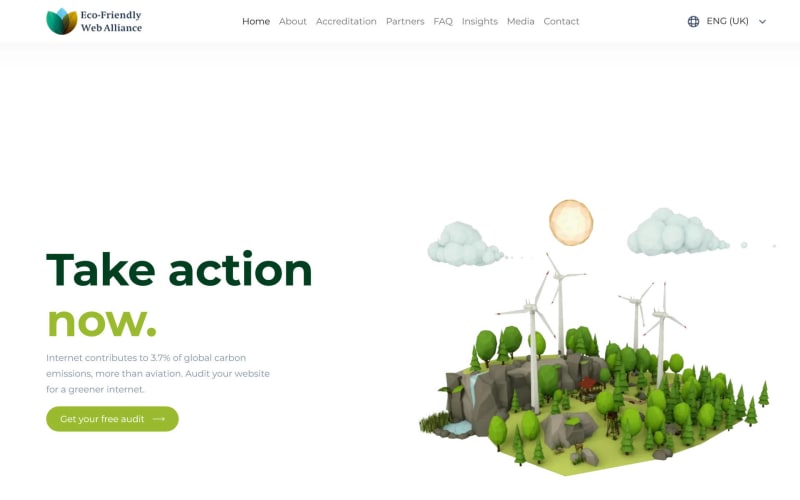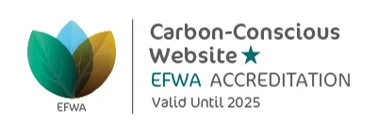
According to recent research, the internet uses 3.7% of ALL of the world’s electricity, which is more than the aviation industry. It’s not just websites that use that power, of course - it’s email, streaming audio and video, Zoom and Teams calls etc. However, websites do make a contribution to that power consumption and that, in turn, contributes to the emission of greenhouse gasses.
One of my aims has always been to create fast websites as these are better for site visitors and better for SEO. They are also better for the environment as they transmit less data over the internet and often require less processing on the server, which means they do less work and use less power. Hosting websites on servers that use renewable energy helps but, unfortunately, many hosting companies are not doing this.
Eco-Friendly Web Alliance
The Eco-Friendly Alliance (EFWA) is a UK based social enterprise with a vision to make a positive impact on the environment. They claim to have set the world’s first eco standard for websites. Their mission is “to create a greener internet by empowering website owners to take action and reduce their environmental impact”.
Their goal is “to build on our global movement for a cleaner and greener internet” with “1 million climate-positive websites by 2030”, including both new websites that are necessary and helping convert existing ones to be low-carbon and high-performing, contributing to the battle against climate change”.

The EFWA conduct independent audits of websites on request and report back on how much carbon each page creates. If every page produces less that 1 gram of CO2 and the site uses green hosting, then the website is eligible to be accredited by the EFWA. If some pages produce more than 1 gram, then the EFWA can advise on reduction measures to bring the page within their criteria. Each accreditation lasts one year after which the EFWA re-test the website to check it is still meeting the criteria.
Why join?
There is an increasing awareness of the CO2 emissions associated with the internet and I wanted to join the EFWA to demonstrate AttractMore’s commitment to web sustainability and the environment. Not only are we committed to digital sustainability, we actively help others to do the same by working with business owners to limit the carbon emissions of their websites. This usually results in faster page load times as a useful consequence.

What can you do to reduce the carbon footprint of your website?
As mentioned on our Environment page, there are a number of useful actions you can take to reduce CO2 emissions form your site.
- Use fewer videos. Videos are increasingly popular on websites for good reasons, so set autoplay to off and keep the length of the videos to only what is necessary. Reducing video content is likely to have the largest effect in bringing down the energy usage of your website.
- Optimise images. To keep energy usage low, don’t load images that are larger than necessary. There are excellent tools available to compress images to and minimise the number of bytes they use without sacrificing quality. Also, please ensure that your site doesn’t load images whose dimensions are larger than needed for the space they occupy on the web page.
- Keep special fonts to a minimum. Each special font has to be downloaded from the server to a user’s device, so the more fonts, the more data is transmitted.
- Caching. Ask your developer to make sure that website data is cached wherever possible, i.e. it’s not downloaded from the server every time it’s used, but can be stored locally for speedy access.
- Hosting. Some hosting companies have more efficient data centres than others. It obviously helps to choose a more efficient one. To their credit, Google are leading on this but bear in mind that many hosting companies do not have their own hosting but use other company’s data centres. For instance, Siteground (a popular hosting company) uses Google servers.
- Search Engine Optimisation. This may seem surprising but if all websites had good SEO, people would be able to find what they needed on the internet more quickly. That would mean fewer searches so less internet traffic and so lower energy usage. Having your site optimised for search not only helps you get found more easily, it can, in a small way, help reduce electricity consumption.
Conclusion
Becoming accredited by the EFWA is a great way of demonstrating a commitment to digital sustainability and to the environment. I believe that all responsible business owners should be working towards meeting the emissions criteria set by the EFWA to reduce our carbon emissions. Just like with recycling paper, glass, plastic etc., the more people who do it, the larger the impact. I hope you will be motivated to take action.
If you’d like to explore reducing the carbon emissions of your site, please get in touch.
References
- Sustainable Web Development Strategies Within An Organization (well worth reading to see the bigger picture and to justify carbon reduction projects)
- Sustainable Design Toolkits And Frameworks (good background and stats)
- Sustainable Web Design
The following 2 website will calculate the carbon emissions from your website:
